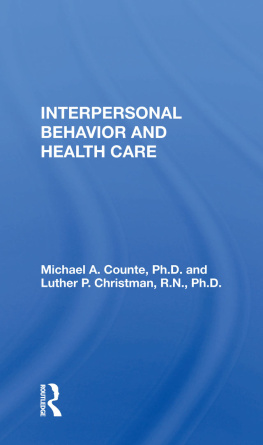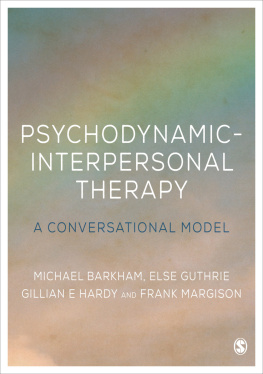Behavioral Sciences for Health Care Professionals
Michael A. Counte, Series Editor
During the 1970s there was rapid growth in the amount of behavioral science instruction included in the training of physicians, nurses, dentists, pharmacists, and other health care professionals. New faculty members were put on staffs at medical centers, curricula were devised, and on occasion, new departments were created to support a diverse group of behavioral scientists.
The new emphasis on behavioral science in education of health care professionals and the inclusion of a behavioral science section in certification examinations have generated a need for clinically relevant text materials. This series responds to that need by providing general, yet concise, introductions to common topical areas in behavioral science curricula, linking concepts and theories to clinical practice.
The authors of the series volumes are behavioral scientists with considerable experience in the education of health care professionals. Most of them are also clinicians, and their varied experience enables them to present their topics in a readable fashion. The content of the texts presumes only a very basic knowledge of the behavioral sciences, and emphasis is placed on the practical implications of research findings for health care delivery.
It is our hope that this multivolume approach will allow each instructor to select the books most pertinent to his or her particular curriculum. The division of topics was planned to enhance the overall flexibility of the information being presented.
Forthcoming in This Series
Biogical Bases of Human Emotion and Cognition, Alfred W. Kaszniak
Stress and Its Relationship to Health and Illness, Linas A. Bieliauskas
Developmental Psychology for the Health Professions: Part 1-From Birth to Adolescence, Katherine A. Billingham
Developmental Psychology for the Health Professions: Part 2-Young Adult Through Aging, Marita Lopezand Howard Feldman
Health Care Delivery Systems , J. C. Salloway
Behavioral Intervention in Health Care, Laura Gordon
Hospital Organization and Health Care Delivery, Luther Christman and Michael A. Counte
Introduction to Social Epidemiology, J. C. Salloway
The Influence of Individual Differences in Health and Illness, Unas A. Bieliauskas
Also of Interest
Health for the Whole Person: The Complete Guide to Holistic Medicine, edited by Arthur C. Hastings, James Fadiman, and James S. Gordon
The Dynamics of Aging: Original Essays on the Processes and Experiences of Growing Old, Forrest J. Berghorn, Donna E. Schafer, and Associates
Aging from Birth to Death: Interdisciplinary Perspectives , edited by Matilda White Riley
Systems of Health Care, Douglas R. Mackintosh
Assuring Quality Ambulatory Health Care: The Martin Luther King jr. Health Center , edited by Donald Angehr Smith and Gitanjali Mukerjee
Available in hardcover and paperback.
Interpersonal Behavior and Health Care
Michael A. Counte, Ph.D.,
and Luther Christman, R.N., Ph.D.
Rush-Presbyterian-St. Luke's Medical Center
Health care professionals are continually puzzled by people who come to their offices showing no symptoms of physical illness. They are also hard pressed to understand those who, in the face of obvious need of medical help, refuse to seek help. This textbook delves into how interpersonal processes influence the origins, functions, and change of health-related beliefs and attitudes.
The authors address such questions as: Why do so many people with nonorganic complaints seek medical aid? Why do so many other people delay getting help despite the presence of medically serious symptoms? How are social networks, such as lay referral systems, linked to the use of medical services? What constitutes the cluster of attitudes called "patient satisfaction," and how are those attitudes related to actual behavior during treatment (for example, compliance with medical instructions)? What do field experiments suggest with regard to modifying health beliefs and attitudes?
Dr. Michael A. Counte is assistant professor and section director of social sciences in the Department of Psychology and Social Sciences at Rush-Presbyterian-St. Luke's Medical Center in Chicago.
Dr. Luther Christman is vice-president of nursing affairs at Rush-Presbyterian-St. Luke's Medical Center and dean of the College of Nursing at Rush University.
First published 1981 by Westview Press, Inc.
Published 2018 by Routledge
52 Vanderbilt Avenue, New York, NY 10017
2 Park Square, Milton Park, Abingdon, Oxon OX14 4RN
Routledge is an imprint of the Taylor & Francis Group, an informa business
Copyright 1981 Taylor & Francis
All rights reserved. No part of this book may be reprinted or reproduced or utilised in any form or by any electronic, mechanical, or other means, now known or hereafter invented, including photocopying and recording, or in any information storage or retrieval system, without permission in writing from the publishers.
Notice:
Product or corporate names may be trademarks or registered trademarks, and are used only for identification and explanation without intent to infringe.
Library of Congress Cataloging in Publication Data
Counte, Michael A.
Interpersonal behavior and health care.
(Behavioral science for health care professionals)
Includes bibliographies and index.
1. SickPsychology. 2. Health attitudes. 3. Health behavior. I. Christman, Luther P. II. Title. III. Series. [DNLM: 1. Sick role. 2. Attitude to health. 3. Health servicesUtilization. W 85 C844i]
R726.5.C7 616'001'9 81-4309
AACR2
ISBN 13: 978-0-367-01880-1 (hbk)
1
Introduction and Overview
General Considerations
Although most of us use the terms health and illness on a fairly frequent basis, either as laymen or as health care professionals, we rarely take the time to stop to consider the full meaning of such distinctions. Since one of the basic premises underlying this volume is that there is great variability in such concepts and that they exert significant influences upon health-related attitudes and actions, let us briefly examine the basic components and characteristics of models of health, why they are socially significant, and how they are related to an underlying view of normality.
To start out with, what are the general characteristics and uses of a model of health? First, it can be characterized as a somewhat organized and coherent system of beliefs or ideas. Second, this set of ideas is susceptible to change over time in light of new evidence. Third, the model defines what types of phenomena are recognized as problems of interest. Fourth, the model usually suggests an explanation of how problems arise and what their probable courses will be. Fifth, the model usually suggests a course of action or therapy to alleviate if not remedy the problem.






